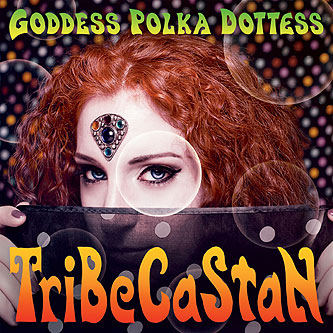 The
NYC-based band known as Tribecastan turned a lot of heads around
with their 2013 CD New Songs From The Old Country and
they’re back big time with a 2015 release, Goddess Polka
Dottess. The 14 track CD continues with the band’s
fascination regarding a vast range of World Music sounds that draws
upon Balkan, Klezmer, Cajon, Zappa-esque instrumentals, Indian sitar
sounds, 1960s psychedelic rock, Americana and even more. In fact,
you’d be hard pressed to find a genre not covered on this superb
sounding CD. Designed with ultra-cool cover art, Goddess Polka
Dottess was produced by the sound team of player / composers John
Kruth and Jeff Greene, who are joined by a host of musicians
adding in all the exotica you could ever want to hear on an album.
Speaking to mwe3.com about their unique working relationship in Tribecastan,
John Kruth explains, "All the albums are co-produced by me
and Jeff. I tend to write the bulk of the material as that's how I
spend my time… writing music, when I'm not writing about music.
Jeff is more visually oriented - a great draftsman and restorer of
historical monuments. When Jeff and I write together it usually has
to do with me helping to shape his compositions or him throwing an
unexpected sound or scale into mine. We have pretty different approaches
and different tastes in music but they tend to merge quite well."
Both Kruth and Greene are masterful multi-instrumentalists and with
the aid of all these fine musicians, Tribecastan hits a new high of
World Music excellence with the color and exotic sounding Goddess
Polka Dottess. www.EverGreeneMusic.com
/ www.TriBeCaStan.tv
The
NYC-based band known as Tribecastan turned a lot of heads around
with their 2013 CD New Songs From The Old Country and
they’re back big time with a 2015 release, Goddess Polka
Dottess. The 14 track CD continues with the band’s
fascination regarding a vast range of World Music sounds that draws
upon Balkan, Klezmer, Cajon, Zappa-esque instrumentals, Indian sitar
sounds, 1960s psychedelic rock, Americana and even more. In fact,
you’d be hard pressed to find a genre not covered on this superb
sounding CD. Designed with ultra-cool cover art, Goddess Polka
Dottess was produced by the sound team of player / composers John
Kruth and Jeff Greene, who are joined by a host of musicians
adding in all the exotica you could ever want to hear on an album.
Speaking to mwe3.com about their unique working relationship in Tribecastan,
John Kruth explains, "All the albums are co-produced by me
and Jeff. I tend to write the bulk of the material as that's how I
spend my time… writing music, when I'm not writing about music.
Jeff is more visually oriented - a great draftsman and restorer of
historical monuments. When Jeff and I write together it usually has
to do with me helping to shape his compositions or him throwing an
unexpected sound or scale into mine. We have pretty different approaches
and different tastes in music but they tend to merge quite well."
Both Kruth and Greene are masterful multi-instrumentalists and with
the aid of all these fine musicians, Tribecastan hits a new high of
World Music excellence with the color and exotic sounding Goddess
Polka Dottess. www.EverGreeneMusic.com
/ www.TriBeCaStan.tv
mwe3 presents an interview
with
John Kruth and Jeff Greene of
TRIBECASTAN
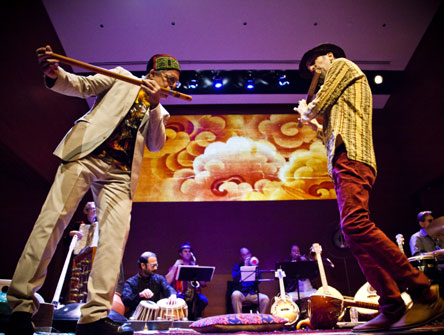 mwe3:
Can you tell us where you’re from originally and where you live
now and what you like best about it? What are your favorite cities
to visit and or do concerts in?
mwe3:
Can you tell us where you’re from originally and where you live
now and what you like best about it? What are your favorite cities
to visit and or do concerts in?
John Kruth: I'm from Livingston New Jersey and live in Greenwich
Village in New York City. I spend my summers in Split Croatia, which
is one of my favorite cities. We just played at MIM - the musical
instrument museum in Phoenix. I always love playing in the west as
well as Europe.
Jeff Greene: I live in Tribeca of course and I grew up in the
Midwest… Ohio and Illinois till I moved to NYC 45 years ago.
Favorite cities, Paris, Amsterdam, London, Rome, Prague. Tribecastan
toured the West Coast and we loved playing the Bay Area, San Fran
and Berkeley.
mwe3: Can you tell us where and when TriBeCaStan was formed
and how the band has grown and evolved since the early days? How has
the band’s approach to writing and recording changed over the
years and has there been a kind of evolution in the approach, sound
and vision of the TriBeCaStan album releases?
John Kruth: TriBeCaStan started when I met Jeff Greene and
saw his wonderful instrument collection. He had a couple of my CDs
and was familiar with my music and mandolin playing. The first album
- Strange Cousin was more of a duo collaboration, a vehicle
for exploring all the sounds and colors of Jeff's instruments. He
had a couple traditional tunes from Afghanistan and places like that.
I had a Don Cherry tune, a Pharaoh Sanders song and a couple of sketches
and we threw it all together with some great guests including Steve
Turre on trombone, Jolie Holland, vocals and fiddle, Brahim Fribgane
- the Moroccan percussionist and Dave Dreiwitz - bassist with Ween.
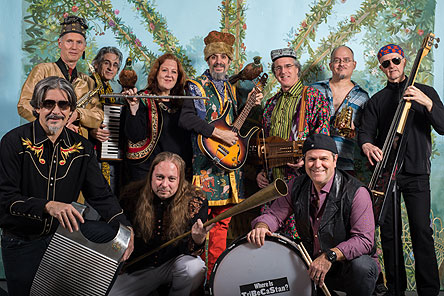 Jeff
Greene: I used to have Labor Day jug band jamborees that really
turned into world music and even outer space music excursions and
Kruth saw a mutual friend walking down the street with his banjo and
decided to tag along to the party about a decade ago. Since we are
both interested in folk and roots music from different cultures we
started to explore various sonic possibilities on some of the instruments
that I have collected over the last 40 years and Tribecastan slowly
emerged. At first it was mostly a duo and then we started to invite
all kinds of other musicians to join us in the studio to experiment
and the sound evolved and became a little more subtle and nuanced
without sacrificing any of the primal energy.
Jeff
Greene: I used to have Labor Day jug band jamborees that really
turned into world music and even outer space music excursions and
Kruth saw a mutual friend walking down the street with his banjo and
decided to tag along to the party about a decade ago. Since we are
both interested in folk and roots music from different cultures we
started to explore various sonic possibilities on some of the instruments
that I have collected over the last 40 years and Tribecastan slowly
emerged. At first it was mostly a duo and then we started to invite
all kinds of other musicians to join us in the studio to experiment
and the sound evolved and became a little more subtle and nuanced
without sacrificing any of the primal energy.
mwe3: What instruments did you study early on and tell us what
some of your favorite instruments are? What are your favorite guitars
and what guitar heroes inspired you to become a professional musician?
John Kruth: I started on harmonica and guitar, influenced as
a kid by Dylan, the Stones and The Beatles. Then I heard Herbie Mann
and later Roland Kirk, who I wrote my first book about, on the flute.
When I was a teenager I heard Gris Gris by Dr. John and there
was a mandolin player on there. I flipped! It was the most exotic
sound I ever heard. I then discovered The Byrds, The Band and most
of all Ry Cooder all had great mandolin playing on their records.
I'm a fan of Keith Richards, Bert Jansch, John Fahey, Jimmy Page and
Richard Thompson to list a few guitarists who have influenced me.
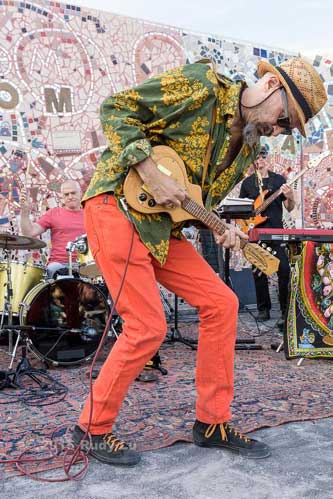 Jeff
Greene: Well I really am an autodidact. Growing up in Chicago
I listened to a lot of blues and Muddy Waters lived in the town next
to mine so I would see him and Howlin' Wolf and JB Hutto and the like
as often as I could. I took a trip to Europe when I was 17 in 1970
and ended up hitchhiking across the Sahara through Tunisia, Algeria
and Morocco. The music I heard there seemed to resonate with my DNA
and at that time I basically started looking for music that I hadn’t
heard before. This included the modal music of the Muslims, but also
African, Indian and South American music and jazz and everything in
between. I got college credit for ethnomusicology by making field
recordings while traveling in Peru, Ecuador and Bolivia.
Jeff
Greene: Well I really am an autodidact. Growing up in Chicago
I listened to a lot of blues and Muddy Waters lived in the town next
to mine so I would see him and Howlin' Wolf and JB Hutto and the like
as often as I could. I took a trip to Europe when I was 17 in 1970
and ended up hitchhiking across the Sahara through Tunisia, Algeria
and Morocco. The music I heard there seemed to resonate with my DNA
and at that time I basically started looking for music that I hadn’t
heard before. This included the modal music of the Muslims, but also
African, Indian and South American music and jazz and everything in
between. I got college credit for ethnomusicology by making field
recordings while traveling in Peru, Ecuador and Bolivia.
To this day I travel and record and study the musical systems of cultures
that interest me. Most recently I had the occasion to travel several
times to Southeast Asia with a Buddhist storyteller and I was able
to absorb many musical elements from that part of the world.
mwe3: John writes a lot of the music but the new album Goddess
Polka Dottess was co-produced by John and Jeff. How do both of
you work together, from the writing of the music to the arranging
and production of the music?
John Kruth: All the albums are co-produced by me and Jeff.
I tend to write the bulk of the material as that's how I spend my
time… writing music, when I'm not writing about music. Jeff is
more visually oriented - a great draftsman and restorer of historical
monuments. When Jeff and I write together it usually has to do with
me helping to shape his compositions or him throwing an unexpected
sound or scale into mine. We have pretty different approaches and
different tastes in music but they tend to merge quite well.
Jeff Greene: All of the Tribecastan recordings are co-produced.
John is so incredibly prolific with his musical writing that it’s
a little hard to keep up. The music just flows out of him. I tend
to have a musical idea and then slowly it takes shape. Often we just
play some combination of instruments together and that serves as a
starting point for some new musical ideas which John quickly distills
down and refines into their melodic essence. Often some of the other
band members will add their special spice or suggestions as we begin
to work out arrangements .
 mwe3:
The title track “Goddess Polka Dottess” closes the CD. How
did you decide to include that poem from the Frank Waters’ book
The Yogi Of Cockroach Court? What does concept / title of “Goddess
Polka Dottess” mean to you? You describe song as a kind of mantra
or is there a kind of spoof in the wording of the title?
mwe3:
The title track “Goddess Polka Dottess” closes the CD. How
did you decide to include that poem from the Frank Waters’ book
The Yogi Of Cockroach Court? What does concept / title of “Goddess
Polka Dottess” mean to you? You describe song as a kind of mantra
or is there a kind of spoof in the wording of the title?
John Kruth: I've chanted a lot of different things in my life…
It just sounded good, kind of sweet. Frank Waters is one of my fave
authors and the Yogi is a classic book that few people seem
to know about. I've thought about using that title for a song or album
before and I was on the subway over to Jim Clouse’s to record
the tune and came upon that passage about the “Dark Madonna”
and it just seemed perfect. When I was young, I loved Jim Morrison
in the early days… how he'd do these strangely spiritual evocations.
The Incredible String Band used spoken word too… Robin Williamson's
“5 Denials On Merlin’s Grave”…
Jeff Greene: The voices of the children on the recording are
my oldest grandkids.
mwe3: A lot of World Music is kind of difficult for many pop
fans to fathom and fully absorb. With Goddess Polka Dottess
did TriBeCaStan try to make World Music more of a fun experience for
the boomers and generation X?
John Kruth: There's no conscious decision to make world music
more fun or more accessible to anyone. I'm just writing music I like
to hear… music I've never heard anywhere else. So, it's a fun
process really. I get an idea or Jeff and I come up with something
together and the next thing you know the band picks up the ball and
runs with it.
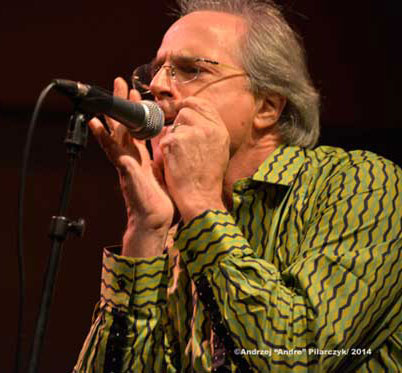 Jeff
Greene: I think our ears are big enough that we include musical
influences from various times and certainly different genres. 1960s
psychedelia, jazz, even TV commercials. We also like to have fun and
really play with the music so hopefully that joy and playfulness comes
through. Perhaps mixing the familiar with the exotic is what makes
the music accessible. But I wouldn’t say this is what we are
striving for, its really more of a consequence of playing what we
like and assimilating all the influences we have absorbed both in
our everyday lives growing up in America as well as our more adventurous
musical explorations.
Jeff
Greene: I think our ears are big enough that we include musical
influences from various times and certainly different genres. 1960s
psychedelia, jazz, even TV commercials. We also like to have fun and
really play with the music so hopefully that joy and playfulness comes
through. Perhaps mixing the familiar with the exotic is what makes
the music accessible. But I wouldn’t say this is what we are
striving for, its really more of a consequence of playing what we
like and assimilating all the influences we have absorbed both in
our everyday lives growing up in America as well as our more adventurous
musical explorations.
mwe3: Goddess Polka Dottess was recorded in Brooklyn.
What is it about Brooklyn that appeals to you most these days?
John Kruth: I lived in Brooklyn in the 1980's… It was
pretty rough then. I always loved Atlantic Avenue and all the Arabic
markets but really, we record there ‘cause that’s where
Jim Clouse lives and works - he's great to work with - wonderful ears
and a good saxophonist himself.
Jeff Greene: Well many of the members of the band live in all
the boroughs of New York including Brooklyn which is now the happenin’
hot spot. But as John says its really just that our very talented
recording engineer Jim Clouse has his studio there that we ended up
there.
mwe3: Goddess Polka Dottess starts off with a track
called “Repo Rodeo”, a song that sets a great tone for the
album. What can you tell us about that track and why you started the
album off with it?
 John Kruth:
I love to mix styles. “Repo Rodeo” is the most American
thing we've recorded… except maybe for “New Foot On Five
Star Cave” or “Louie’s Luau” on New Deli
- both banjo tunes. But, “Repo Rodeo” begins in Appalachia
and winds up in Iraq, Syria… Kind of like the soldiers who have
been deployed to the Mideast. We started the album with it cause it’s
high energy. We’ve kicked off a few shows that way too. If you'd
been following this music, the track definitely took you by surprise.
John Kruth:
I love to mix styles. “Repo Rodeo” is the most American
thing we've recorded… except maybe for “New Foot On Five
Star Cave” or “Louie’s Luau” on New Deli
- both banjo tunes. But, “Repo Rodeo” begins in Appalachia
and winds up in Iraq, Syria… Kind of like the soldiers who have
been deployed to the Mideast. We started the album with it cause it’s
high energy. We’ve kicked off a few shows that way too. If you'd
been following this music, the track definitely took you by surprise.
Jeff Greene: Well "Repo Rodeo has the right energy to
kick off the record and it’s quintessential Tribecastan with
its bluegrass beginning and then a sojourn to the Middle East and
then back to the down home country with a little circus thrown in.
mwe3: “Bangalorious” is another highlight of Goddess
Polka Dottess. I guess you’re alluding to the city in India?
Is Indian music the most influential World Music sound or are there
others? But you infuse “Bangalorious” with some cool harp
riffs and of course that Farfisa organ sound. I don’t think World
Music has ever sounded this cool! Sort of Spencer Davis Group meets
the Maharishi… in Brooklyn!
John Kruth: Thanks that's a good analogy Robert… I like
that. There’s a bit of Eddie Harris and Les McCann’s (try
to make it real) compared to what in that groove. But yes, I’d
spent some time in Bangalore a few years ago and I guess this is just
a sonic portrait of that bustling city.
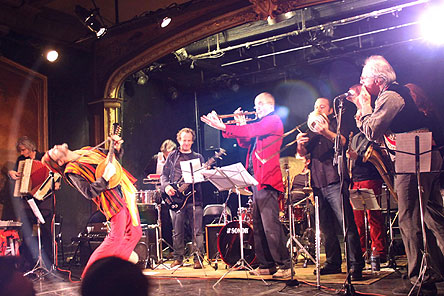 Jeff
Greene: In addition to Ray Peterson’s bass backbone and John’s
electric sitar and Kenny’s rock organ there is also the Turkish
yayli tanbur going for a little outer space vibe in there as well.
Jeff
Greene: In addition to Ray Peterson’s bass backbone and John’s
electric sitar and Kenny’s rock organ there is also the Turkish
yayli tanbur going for a little outer space vibe in there as well.
mwe3: “Majestic Ganesh” is the only kind of rock
type track on Goddess Polka Dottess. The track kind of sounds
inspired by “Bangalorious” but “Majestic Ganesh”
is a vocal track that kind of sounds like early Traffic. Who sings
that track and is there a cool story about it? Is it really about
an Elephant God? I think George Harrison would have liked it!
John Kruth: Well thanks… I love early Traffic and hope
George would have liked it too. If you go back and check out earlier
albums, there are many titles that evoke Indian myth, gods and demigods
- whether Kali or Kroncha. That’s me singing. I began my career
as a singer/songwriter. I’ve got 10 albums out in that style.
We usually do a vocal tune or two live and on the albums, to mix things
up a bit.
Jeff Greene: What can I say, but Ganesh smiles on all of us.
mwe3: “Zoli’s Strut” is interesting, Has TriBeCaStan
done any movie soundtracks and likewise, do you draw some of your
musical inspirations from movies and movie soundtracks?
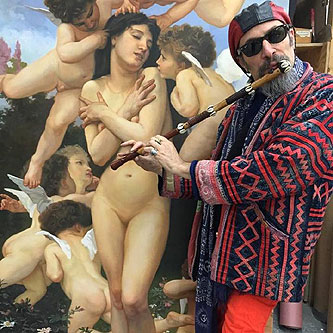 John
Kruth: Zoli was my great grandmother from Budapest Hungary. I
heard that she was a fan of a dance known, back in the day as the
“black bottom.” I actually wrote the melody of the tune
not on the mandolin but the Hungarian Kaval that I bought in ‘Pest
when Jeff and I were there a few years back, and if you have any connections
for film soundtrack work please let me know!
John
Kruth: Zoli was my great grandmother from Budapest Hungary. I
heard that she was a fan of a dance known, back in the day as the
“black bottom.” I actually wrote the melody of the tune
not on the mandolin but the Hungarian Kaval that I bought in ‘Pest
when Jeff and I were there a few years back, and if you have any connections
for film soundtrack work please let me know!
Jeff Greene: John recently did a sound track to a movie on
Nepal and Evergreene Music supplied some of the traditional Afghan
music for “The Kite Runner” several years ago. Several folks
have suggested that Tribecastan would make great soundtrack music,
but we are still waiting for the sound supervisors to figure out what
to do with us.
mwe3: What inspired “The Mahakala Stomp”? Sounds
like funk meets jazz and more?
John Kruth: Jeff had this unusual instrument, please ask him
what it's called and he starts the tune off with it. A mouth organ
from Thailand or Laos or Cambodia… And I brought the funk in.
Kind of a Maceo Parker thing perhaps and played a western mouth organ,
the harmonica. We tradeoff riffs, east / west… that was the idea.
Jeff Greene:On a trip to a cloud shrouded village in the highlands
of Laos I came across this opium smoking musician playing the Hmong
Queej. Traditionally its used to summon the spirits. Back in New York
we were asked to play at the Rubin Museum and to write some music
inspired by their collection of Himalayan art. In true Tribecastani
fashion we choose Malakala the wrathful Tibetan deity who is so frightful
that he scares death to death. The combination of different kinds
of eastern and western free reeds seemed perfect.
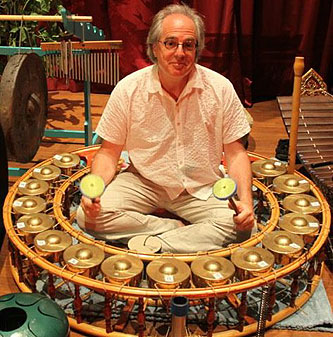 mwe3:
How about track 11 on Goddess Polka Dottess, “The Surfing
Swami”? It’s a bit tongue in cheek but with lots of cool
musical moves. What brought that track on?
mwe3:
How about track 11 on Goddess Polka Dottess, “The Surfing
Swami”? It’s a bit tongue in cheek but with lots of cool
musical moves. What brought that track on?
John Kruth: “The Surfing Swami” was written on the
Portuguese guitar with an unusual tuning. I was visiting my sister
in Southern California and heard about a surfing swami at Yogananda’s
self-realization fellowship in San Diego… hence the title. I
was also listening to Pet Sounds a lot and was influenced by
the brilliant Brian Wilson.
Jeff Greene: John’s said it all here, I just added a little
floating vibe on the vibes.
mwe3: Track 13, “Borislav” sounds like a Russian
marching song, of course with the sitar droning away in the background!
Was Russian or eastern Euro music an influence on that track and how
did you come up with the title? Would you say Eastern European music
is a bigger influence than Indian music in TriBeCaStan’s sound?
John Kruth: I was inspired to write “Borislav” when
we drove thru the town of the same name in Czech Republic. I actually
wrote the tune on a sitar, which is odd as it’s a bit of a Russian
folk dance. It’s for our percussionist Boris Kinberg. Everything
is an influence on TriBeCaStan - from Ornette Coleman to Balkan music
to Shakuhachi flute to Gnawa music to Frank Zappa to Kurt Weil and
cartoon music - listen to and love it all… Jeff would probably
have a whole different list to add here.
Jeff Greene:We did a tour of Europe including the Czech Republic
and the Ancient Trance festival in Leipzig, Germany and ending in
Amsterdam. Klezmer Punk might be an apt description of “Borislov”.
I think you know John used to tour with the Violent Femmes, yes? Both
John and I have always been fond of Eastern European influences, it’s
in our blood after all.
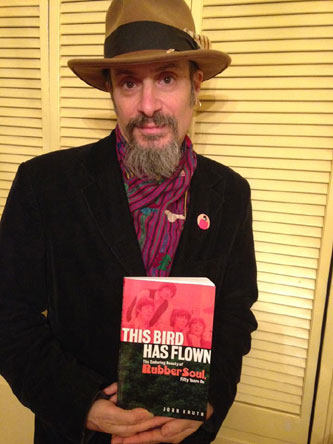 mwe3:
John is also a noted author and I was reading about his 2015 book
on the Beatles called This Bird Has Flown. Is Rubber Soul
the most influential Beatles album? How do you balance your time as
a musician, composer and author? Are there other avenues that you’re
interested in exploring besides the musical and literary world?
mwe3:
John is also a noted author and I was reading about his 2015 book
on the Beatles called This Bird Has Flown. Is Rubber Soul
the most influential Beatles album? How do you balance your time as
a musician, composer and author? Are there other avenues that you’re
interested in exploring besides the musical and literary world?
{This
Bird Has Flown - The Enduring Beauty of Rubber Soul - 50 Years On
(The anniversary of the American release will be Dec 6.). A trade-paperback
edition published by BackBeat Books/Hal Leonard You can order a copy
directly from me - $25 signed, sealed and delivered (more postage
for Canada and Europe) either send money to PayPal c/o jvonkruth@gmail.com
or send a check to me @ 88 bleecker street #2L ny, ny 10012 - with
illustrations by Glenn A. Wolff, a bunch of fab fotos and new interviews
with Al Kooper, Felix Cavaliere, John Sebastian, Howard Kaylan, Steve
Katz, Steve Earle, Barry Goldberg, Richie Havens, Lenny Kaye, Carol
Kaye, Joel Dorn, and Cousin Bruce Morrow - note from editor}
John
Kruth: Music is really my love and calling. When I’m not
playing music I write about the music I love, its impact on spirit
and society. I've been teaching music history on a college level for
nearly 10 years now. Interests outside of music and literature include
dogs, cats, yoga, the Gita, swimming and hiking in Dalmatia in the
summertime uh… more music!
Jeff Greene: John is being very modest here. He has just participated
in the musical scores for several downtown avant garde plays at La
Mama and other venues including “Dig Infinity” about Lord
Buckley.
mwe3: Can you tell us about TriBeCaStan’s label Evergreene
Music? When did the label start, how many albums have been released
so far and what’s the label mission as far as planning more releases,
CD and DVDs in the future?
Jeff Greene: Evergreene Music started when I made a recording
of my Afghan rubab teacher Quraishi and Paramount Dreamworks called
and ask if they could use a song in the “Kite Runner” movie.
Apparently they found a bootleg tape in the marketplace in Kashgar.
How wild is that! Evergreene also recently released a set of vinyl
recordings of music recorded in the Balkans back in the 1960s and
early 70s called the Balkan Art Series, as well as the soundtrack
for the movie Brasslands. The more obscure the better as far
as I am concerned. I am sure there will be more Tribecastan recordings
because there are simply so many interesting musical ideas to explore.
 mwe3:
What’s next for TriBeCaStan for 2016? 2015 is almost part of
history now. What kind of album would you like to make next and what
other goals do you have for TriBeCaStan as we move into the future?
Are you also planning any new solo albums and/or new literary works?
mwe3:
What’s next for TriBeCaStan for 2016? 2015 is almost part of
history now. What kind of album would you like to make next and what
other goals do you have for TriBeCaStan as we move into the future?
Are you also planning any new solo albums and/or new literary works?
John Kruth: There's always new ideas for future albums with
TriBeCaStan… we'll just have to see how the tunes take shape.
The music is the compass on our “journey.” The instruments
we play really have a big hand in guiding it as well. I am currently
working on a new book for the University of Texas Press called Friend
of the Devil - the glorification of the outlaw in western song
from Robin Hood to Rap. It’s quite a tome.
I just released my first solo album in seven years, I’ve been
busy with TriBeCaStan and a few other musical projects. Check out
my macabre parlor band Villa Delirium with Kenny Margolis - keys and
accordion player with TriBeCaStan. My new album - The Drunken Wind
Of Life was an interesting project, setting music to the poems
of Tin Ujevic - the great bard of Croatia who died the year I was
born, 1955. It features members of Camper van Beethoven, Samantha
Parton from Be Good Tanyas, Jolie holland and Croatian musicians.
Thanks Robert - as we say in TriBeCaStan - may all the gods smile
upon you at once without your skull exploding!
 Jeff
Greene: Yes, there are so many sounds which haven’t been
heard yet. I have a musical study trip coming up to Ethiopia after
the beginning of the year and I am sure that will be inspiring . My
compulsion to discover and try new instruments and understand how
different cultures perceive and make music and what its function is
and can be for our times is an inexhaustible source of creative energy.
Jeff
Greene: Yes, there are so many sounds which haven’t been
heard yet. I have a musical study trip coming up to Ethiopia after
the beginning of the year and I am sure that will be inspiring . My
compulsion to discover and try new instruments and understand how
different cultures perceive and make music and what its function is
and can be for our times is an inexhaustible source of creative energy.



 The
NYC-based band known as Tribecastan turned a lot of heads around
with their 2013 CD New Songs From The Old Country and
they’re back big time with a 2015 release, Goddess Polka
Dottess. The 14 track CD continues with the band’s
fascination regarding a vast range of World Music sounds that draws
upon Balkan, Klezmer, Cajon, Zappa-esque instrumentals, Indian sitar
sounds, 1960s psychedelic rock, Americana and even more. In fact,
you’d be hard pressed to find a genre not covered on this superb
sounding CD. Designed with ultra-cool cover art, Goddess Polka
Dottess was produced by the sound team of player / composers John
Kruth and Jeff Greene, who are joined by a host of musicians
adding in all the exotica you could ever want to hear on an album.
Speaking to mwe3.com about their unique working relationship in Tribecastan,
John Kruth explains, "All the albums are co-produced by me
and Jeff. I tend to write the bulk of the material as that's how I
spend my time… writing music, when I'm not writing about music.
Jeff is more visually oriented - a great draftsman and restorer of
historical monuments. When Jeff and I write together it usually has
to do with me helping to shape his compositions or him throwing an
unexpected sound or scale into mine. We have pretty different approaches
and different tastes in music but they tend to merge quite well."
Both Kruth and Greene are masterful multi-instrumentalists and with
the aid of all these fine musicians, Tribecastan hits a new high of
World Music excellence with the color and exotic sounding Goddess
Polka Dottess.
The
NYC-based band known as Tribecastan turned a lot of heads around
with their 2013 CD New Songs From The Old Country and
they’re back big time with a 2015 release, Goddess Polka
Dottess. The 14 track CD continues with the band’s
fascination regarding a vast range of World Music sounds that draws
upon Balkan, Klezmer, Cajon, Zappa-esque instrumentals, Indian sitar
sounds, 1960s psychedelic rock, Americana and even more. In fact,
you’d be hard pressed to find a genre not covered on this superb
sounding CD. Designed with ultra-cool cover art, Goddess Polka
Dottess was produced by the sound team of player / composers John
Kruth and Jeff Greene, who are joined by a host of musicians
adding in all the exotica you could ever want to hear on an album.
Speaking to mwe3.com about their unique working relationship in Tribecastan,
John Kruth explains, "All the albums are co-produced by me
and Jeff. I tend to write the bulk of the material as that's how I
spend my time… writing music, when I'm not writing about music.
Jeff is more visually oriented - a great draftsman and restorer of
historical monuments. When Jeff and I write together it usually has
to do with me helping to shape his compositions or him throwing an
unexpected sound or scale into mine. We have pretty different approaches
and different tastes in music but they tend to merge quite well."
Both Kruth and Greene are masterful multi-instrumentalists and with
the aid of all these fine musicians, Tribecastan hits a new high of
World Music excellence with the color and exotic sounding Goddess
Polka Dottess. mwe3:
Can you tell us where you’re from originally and where you live
now and what you like best about it? What are your favorite cities
to visit and or do concerts in?
mwe3:
Can you tell us where you’re from originally and where you live
now and what you like best about it? What are your favorite cities
to visit and or do concerts in? Jeff
Greene: I used to have Labor Day jug band jamborees that really
turned into world music and even outer space music excursions and
Kruth saw a mutual friend walking down the street with his banjo and
decided to tag along to the party about a decade ago. Since we are
both interested in folk and roots music from different cultures we
started to explore various sonic possibilities on some of the instruments
that I have collected over the last 40 years and Tribecastan slowly
emerged. At first it was mostly a duo and then we started to invite
all kinds of other musicians to join us in the studio to experiment
and the sound evolved and became a little more subtle and nuanced
without sacrificing any of the primal energy.
Jeff
Greene: I used to have Labor Day jug band jamborees that really
turned into world music and even outer space music excursions and
Kruth saw a mutual friend walking down the street with his banjo and
decided to tag along to the party about a decade ago. Since we are
both interested in folk and roots music from different cultures we
started to explore various sonic possibilities on some of the instruments
that I have collected over the last 40 years and Tribecastan slowly
emerged. At first it was mostly a duo and then we started to invite
all kinds of other musicians to join us in the studio to experiment
and the sound evolved and became a little more subtle and nuanced
without sacrificing any of the primal energy. Jeff
Greene: Well I really am an autodidact. Growing up in Chicago
I listened to a lot of blues and Muddy Waters lived in the town next
to mine so I would see him and Howlin' Wolf and JB Hutto and the like
as often as I could. I took a trip to Europe when I was 17 in 1970
and ended up hitchhiking across the Sahara through Tunisia, Algeria
and Morocco. The music I heard there seemed to resonate with my DNA
and at that time I basically started looking for music that I hadn’t
heard before. This included the modal music of the Muslims, but also
African, Indian and South American music and jazz and everything in
between. I got college credit for ethnomusicology by making field
recordings while traveling in Peru, Ecuador and Bolivia.
Jeff
Greene: Well I really am an autodidact. Growing up in Chicago
I listened to a lot of blues and Muddy Waters lived in the town next
to mine so I would see him and Howlin' Wolf and JB Hutto and the like
as often as I could. I took a trip to Europe when I was 17 in 1970
and ended up hitchhiking across the Sahara through Tunisia, Algeria
and Morocco. The music I heard there seemed to resonate with my DNA
and at that time I basically started looking for music that I hadn’t
heard before. This included the modal music of the Muslims, but also
African, Indian and South American music and jazz and everything in
between. I got college credit for ethnomusicology by making field
recordings while traveling in Peru, Ecuador and Bolivia.
 Jeff
Greene: I think our ears are big enough that we include musical
influences from various times and certainly different genres. 1960s
psychedelia, jazz, even TV commercials. We also like to have fun and
really play with the music so hopefully that joy and playfulness comes
through. Perhaps mixing the familiar with the exotic is what makes
the music accessible. But I wouldn’t say this is what we are
striving for, its really more of a consequence of playing what we
like and assimilating all the influences we have absorbed both in
our everyday lives growing up in America as well as our more adventurous
musical explorations.
Jeff
Greene: I think our ears are big enough that we include musical
influences from various times and certainly different genres. 1960s
psychedelia, jazz, even TV commercials. We also like to have fun and
really play with the music so hopefully that joy and playfulness comes
through. Perhaps mixing the familiar with the exotic is what makes
the music accessible. But I wouldn’t say this is what we are
striving for, its really more of a consequence of playing what we
like and assimilating all the influences we have absorbed both in
our everyday lives growing up in America as well as our more adventurous
musical explorations. John Kruth:
I love to mix styles. “Repo Rodeo” is the most American
thing we've recorded… except maybe for “New Foot On Five
Star Cave” or “Louie’s Luau” on New Deli
- both banjo tunes. But, “Repo Rodeo” begins in Appalachia
and winds up in Iraq, Syria… Kind of like the soldiers who have
been deployed to the Mideast. We started the album with it cause it’s
high energy. We’ve kicked off a few shows that way too. If you'd
been following this music, the track definitely took you by surprise.
John Kruth:
I love to mix styles. “Repo Rodeo” is the most American
thing we've recorded… except maybe for “New Foot On Five
Star Cave” or “Louie’s Luau” on New Deli
- both banjo tunes. But, “Repo Rodeo” begins in Appalachia
and winds up in Iraq, Syria… Kind of like the soldiers who have
been deployed to the Mideast. We started the album with it cause it’s
high energy. We’ve kicked off a few shows that way too. If you'd
been following this music, the track definitely took you by surprise. Jeff
Greene: In addition to Ray Peterson’s bass backbone and John’s
electric sitar and Kenny’s rock organ there is also the Turkish
yayli tanbur going for a little outer space vibe in there as well.
Jeff
Greene: In addition to Ray Peterson’s bass backbone and John’s
electric sitar and Kenny’s rock organ there is also the Turkish
yayli tanbur going for a little outer space vibe in there as well. John
Kruth: Zoli was my great grandmother from Budapest Hungary. I
heard that she was a fan of a dance known, back in the day as the
“black bottom.” I actually wrote the melody of the tune
not on the mandolin but the Hungarian Kaval that I bought in ‘Pest
when Jeff and I were there a few years back, and if you have any connections
for film soundtrack work please let me know!
John
Kruth: Zoli was my great grandmother from Budapest Hungary. I
heard that she was a fan of a dance known, back in the day as the
“black bottom.” I actually wrote the melody of the tune
not on the mandolin but the Hungarian Kaval that I bought in ‘Pest
when Jeff and I were there a few years back, and if you have any connections
for film soundtrack work please let me know! mwe3:
How about track 11 on Goddess Polka Dottess, “The Surfing
Swami”? It’s a bit tongue in cheek but with lots of cool
musical moves. What brought that track on?
mwe3:
How about track 11 on Goddess Polka Dottess, “The Surfing
Swami”? It’s a bit tongue in cheek but with lots of cool
musical moves. What brought that track on?
 mwe3:
What’s next for TriBeCaStan for 2016? 2015 is almost part of
history now. What kind of album would you like to make next and what
other goals do you have for TriBeCaStan as we move into the future?
Are you also planning any new solo albums and/or new literary works?
mwe3:
What’s next for TriBeCaStan for 2016? 2015 is almost part of
history now. What kind of album would you like to make next and what
other goals do you have for TriBeCaStan as we move into the future?
Are you also planning any new solo albums and/or new literary works?